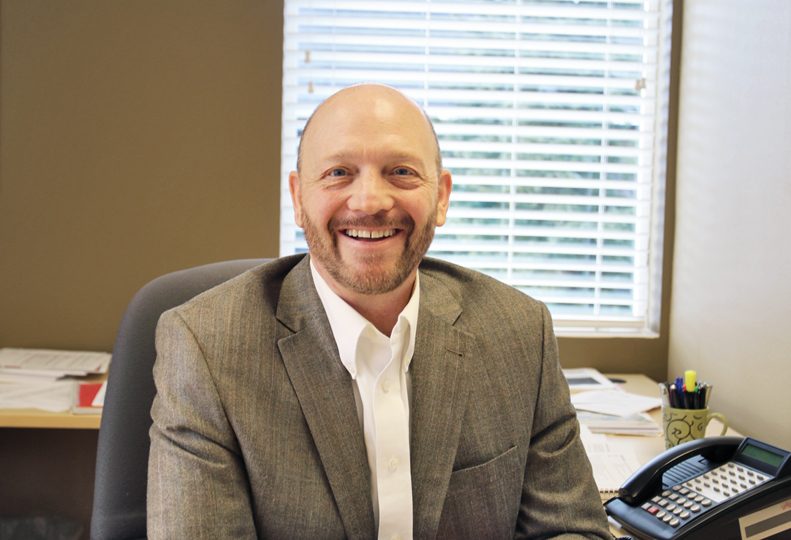
Home » Taking the wastefulness out of water usage
Taking the wastefulness out of water usage
Cascade Earth grows with ag industry, potato trend

February 1, 2018
Recent growth in Washington state’s potato industry has helped to fuel an increase in demand for the services provided by the Spokane Valley office of Cascade Earth Sciences, says Steve Venner, the Washington regional manager based here.
Last year’s figures are still being compiled, but in 2016, the Washington State Department of Agriculture says potatoes, preceded only by apples and milk, were the third largest commodity in the state, topping $800 million in production.
“As water and energy conservation continues to be a focus in the region, CES is experiencing significant growth in our ag services business to help growers use their irrigation equipment more effectively and efficiently,” Venner says.
Overall ag production in Washington state topped $10.6 billion in 2016, according to the WSDA.
CES works closely with the farmers and fresh water irrigations that grow food. Through irrigation scheduling, CES can give farmers more detailed information on how much and when to irrigate, while providing engineering services for their irrigation systems, he says.
CES was founded in 1976 as a soil consulting firm in Albany, Ore. The company expanded to offices here, Pasco, Wash.; Pocatello, Idaho; Visalia, Calif.; and Beijing.
In 1998, Valmont Industries Corp., located in Omaha, Neb., acquired CES and made it a wholly-owned subsidiary. Valmont Irrigation is one of the world’s largest mechanized irrigation companies in the world, says Steven Venner.
Valmont also has offices in Africa, China, and India, he says.
Using agronomic, engineering, and hydrogeologic technologies, says Venner, “Simply put, we help take the waste out of water.”
Including Venner, six employees occupy modest office space in a suite at 12720 E. Nora, in Spokane Valley.
The Spokane Valley CES office employs two soil scientists, a chemical engineer, a data technician, an office administrator, and Venner, he says.
Companywide, the majority of technical staff had professional experience in a variety of sciences prior to joining the company. Staff members also have diverse academic, governmental, industrial and regulatory experience, says CES.
“Being located in Spokane has been good for us, because the labor market is stronger here and in North Idaho than in the locations where our customers are,” Venner says.
It’s not uncommon for the Spokane Valley office to be sparsely populated with staff during most weeks as CES manages 30,000 acres of land-based water treatment systems, and mechanical treatment systems, in municipalities in and around Connell, Moses Lake and particularly the Tri-Cities, Venner says.
“The majority of our clients are industrial food processors and municipalities that have land-based water treatment as part of their system,” he says.
As the demand for water grows for its ag-based customers, the need for effective management and efficient water use grows as well. CES is charged with creating natural site features to reduce cost and improve water quality and availability, he says.
That’s accomplished through automated monitoring of soil moisture, managing animal waste treatment, and helping farmers with effective irrigation and watering, he says.
The U.S. Environmental Protection Agency and individual states regulate wastewater discharge to surface waters through the National Pollution Discharge Elimination System programs. Process water and wastewater are expensive to treat because water quality standards are higher than ever before, Venner says.
Due to large volumes of water requiring treatment, many industries and municipalities are using land application to avoid discharge to surface water.
Land-based water treatment systems reuse wastewater through agricultural irrigation, including forage grasses, grains and hybrid poplars to help protect fresh water supplies. CES says it has completed more than 500 land application projects in the last decade.
“Our systems are efficient, effective, environmentally friendly and they’re often 30 percent to 50 percent less expensive than mechanical treatment methods,” Venner says.
System owners may choose whether to operate and whether to own or lease a finished CES project. The company also offers complete waste management and reuse services.
Though primarily an environmental consulting firm, CES has decades of experience with a wide variety of design-build projects that include water treatment, large ponds and lagoons, irrigation systems, dam removals, river diversions, pump stations, and mine reclamation, Venner says.
He adds, “We don’t build bridges and roads nor do we build $60 million treatment plants.”
The company’s services include system design, cost estimating, procurement, general contracting, and construction inspection, he says.
Venner, who’s also an agronomist, has served as a consultant to the city of Pasco since 1996, helping it operate its centralized wastewater treatment system.
“We have very high quality standards,” Venner says. “We’ve been around for a while and truly have an understanding of our clients and the region they’re in.”
Latest News Up Close Technology
Related Articles
Related Products




